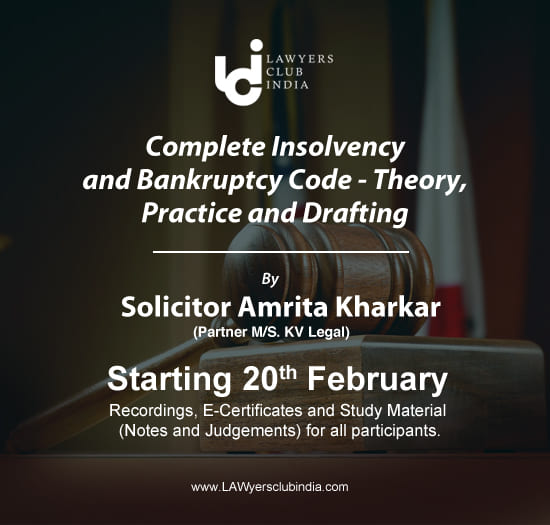Recently, the Chief Justice of India (CJI) in connection with the Siddique Kappan's interim bail plea petition, is reported to have said that Supreme Court (SC) wants to discourage filing of fresh petitions under article 32 and asked the senior counsel for the petitioner to approach the Allahabad High Court (HC) instead.
The earlier assertion in some other context that the right of a citizen to approach the apex court is a fundamental right under Article 32 of the Constitution and the repeated assertions that the SC wants to discourage fresh petitions under Article 32 of the Constitution has triggered the legal fraternity to scan through the Constitutional Law in general and Articles 32 and 226 in specific to check as to what might be most appropriate in such cases.
Click here to enroll masterclass on - The IBC - Theory, and Practice by Adv. Amrita Kharkar
Article 32
"Accordingly the sum and substance of Article 32 as enumerated in the Constitutional Law is that Article 32 is itself a fundamental right. Any person complaining of infraction of any fundamental right guaranteed by the Constitution is at liberty to move the SC. The SC cannot refuse an application u/A 32 merely that such an application has been made to the SC in the first instance, without resorting to a High Court (HC) under Article 226".
Geographical Limits u/A 226
Further, when a person is detained by the police of some other state, on some charges, the question of geographical limits arise in the case of HCs. Hence, knocking on the doors of the SC for relief seems to be more appropriate than knocking on the doors of the HC of the other state where a he is detained.
It may be recalled that the Siddique Kappan, a freelance journalist from Kerala was arrested by the UP police, while he was on his way to Hathras to report a rape and death of a Dalit teenage girl. The UP police arrested him on the charges of sedition under Unlawful Activities (Prevention) Act (UAPA).
The Kerala Union of Working Journalists (KUWJ) has filed habeas corpus petition, challenging the detention of their fellow journalist before the apex court.
"Ordinarily, u/A 32, a person who complains of the infraction of his fundamental rights shall only be the petitioner for relief. But an exception to this general proposition is admitted in the case of habeas corpus where any person can move the SC, provided he is not an absolute stranger".
The UP police has in its counter-affidavit charged that the journalist belonged to certain banned organisation and had come to create social unrest etc, has been denied by the petitioner association vide its rejoinder to the affidavit.
The apex court presumably did not want to deal with the determination of facts of the case, which looms large than the question of law and suggested to approach the Allahabad HC.
"But, the SC cannot refuse on the mere fact that the application involves an enquiry into the disputed questions of fact or the taking of evidence".
But whether it’s the apex court under Article 32 or any high court under Article 226, being the courts of ‘original jurisdiction’ will have to determine the law through the prism of facts by scrutinizing the affidavits/counter-affidavits and rejoinder to the affidavit.
Even the Appellate Courts’ jurisdiction also involves rehearing on questions of law as well as facts as evidenced by the SC in Manjula & Ors Vs Shyamsundar & Ors (LL 2021 SC 52).
The trial courts extensively do the same but it is through the examination-in-chief/cross examination/re-examination of the witnesses with the support of the exhibits produced.
In nutshell, it can be said that determination of facts and the law are integral part of the justice delivery system, whether it is the court of original /appellate jurisdiction.
Although it is not clear in what context the above opinion was expressed, but it seems the apex court has done right thing by not discouraging further, the application under Article 32 of the Constitution.
Join LAWyersClubIndia's network for daily News Updates, Judgment Summaries, Articles, Forum Threads, Online Law Courses, and MUCH MORE!!"
Tags :constitutional law










